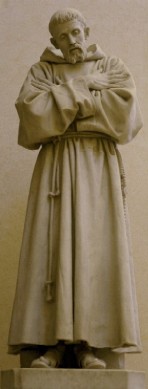I came across a weird video at an atheist site which is supposed to be a humorous yet serious look at the "methods" of cults. Given the site it was at, it was clearly posted to criticize not just cults, but religion as well. But I find the video content to be rather ironic. The video certainly nails the way a cult works; I think here specifically of $cientology.
(As a warning there are two scenes which could be considered "graphic" because it has implied murder)
Mind Control Made Easy
Now, having seen the video, think of things you've heard from atheists:
"Religious people are ignorant or stupid, but WE [atheists] know better."
"Your religious parents just don't understand, you should avoid them."
"Don't read that religious garbage, it will only confuse or trick you."
"It's not a miracle, although we can't explain it, there's obviously some scientific explanation for it."
"It's us against those religious nuts."
I've even seen a "Church of Freethought" a "church for non-believers." The complete irrationality of that one just floors me!
Overall, atheism might not be an organized religion, but you can see it's mindset being rather cult like and aggressive.
For instance, the next big controversy will probably be this Christmas. New Line Cinema (the ones who gave us "The Lord of the Rings" trilogy) will be releasing the first movie of the "His Dark Materials" trilogy called "The Golden Compass." They are written by Philip Pullman, who "is a Distinguished Supporter of the British Humanist Association and an Honorary Associate of the National Secular Society." You can read more about him and his works at the two links just listed.

The "His Dark Materials" trilogy has been called an "antithesis to the Chronicles of Narnia," and it is pretty anti-Catholic/Christian. It will be controversial because of this, and the fact that the movie looks to be a rather beautifully filmed fantasy movie aimed mainly at young adults..
So, remember, I predict the next big "Da Vinci Code-esque" controversy will be this December.
Like I said, I often find that all the criticisms of religion which are made by atheists tend to be amazingly accurate of themselves as well. Guess we'll just all have to turn discordian. LOL.
RS






2 comments:
I am a regular reader of your blog (especially this summer, as I am working on a book of Biblical Latin verses geared for Latin students) - thank you so much for the materials you are sharing in your blog. It's very interesting reading.
I did want to comment abut the Philip Pullman books. I think that, as with the Da Vinci Code, the issue is by no means that they are atheistic. Rather, they gain their power (and it is a quite undeniable power) from the fact that the Christian tradition in the ancient world is far more diverse than the Christianity we know today. These books do not deny the existence of God, but they tell a very different story than what people hear in church. Many people, both Christians and non-Christians, find these "other" stories absolutely captivating, understandably so. The stories that Philip Pullman tells are very much informed by ancient texts that could be labeled gnostic, which is not to say that these are always antithetical to the Catholic tradition. Just take a look at Liber III Esdrae for example, and the magnificent appearance of Uriel (Urihel) there. The story of the revelations of Uriel has much in common with the stories that Pullman tells in his books.
Benedictus Deus veritatis, as it says there.
Hmm, maybe atheistic isn't an accurate description of Pullman. However, he does appear to be a critic of dogma, which seems a paradox since saying there are no dogmas is in fact a rather dogmatic statement itself.
I guess I would find it difficult to believe you could have a religion (or even a "belief system") if you have no axiomatic beliefs. At that point you have no objective basis for any reality.
Post a Comment